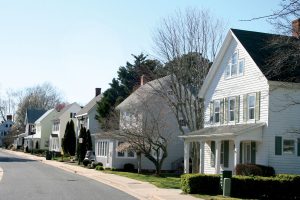By Jack Chavez, Staff Writer

FILE PHOTO
Two weeks into its implementation, the short-term rental ordinance has only met minimal pushback from landlords.
Nearly two weeks into the implementation of Berlin’s short-term rental ordinance, everything seems to be running smoothly, according to Planning Director Dave Engelhart.
“The only thing is I still get people in the R-1 and R-2 (zones) who don’t like the fact it has to be their permanent residence,” Engelhart said. “That’s still unpopular with those people. For the people who want to own a second home and have it not be a primary residence, there’s no real avenue for them to (obtain) a short-term rental license, so that’s the pushback.”
Engelhart said that he wanted to see the ordinance pushed back to January to let already-made reservations go through, but an 11th-hour debate between members of the Town Council two weeks ago did nothing to stop the July 1 implementation.
“It would have been a way to let operators have time to figure out what they were going to do — go back to renting their homes on a long-term basis as a regular rental, sell it, whatever they’re going to do. It would’ve just given them some breathing room,” Engelhart said.
Engelhart added that currently, his department is sifting through short-term rental applications and that no drastic change is imminent now with the implementation in place.
“We’ve been working on this going on three years now,” he said. “We’re moving along.”
So what exactly does the short-term rental ordinance do?
“It is the intent of this section and the regulations stated … to maintain the character of residential neighborhoods in the Town of Berlin and to protect the health, safety and general welfare of residents while allowing short term (sic) rentals to exist under certain conditions and circumstances,” the ordinance states.
Most critical to many, the ordinance stipulates that owners of short-term rentals must make the property their permanent residence, which the ordinance defines as a property in which a property owner lives for an aggregate of at least 180 days annually. The ordinance goes on to state that “the dwelling unit (must carry) the official designation as the owners’ principal residence in accordance with the criteria governing the State of Maryland Department of Assessment and Taxation Homestead Tax Credit Program.”
According to the code, “short term (sic) residential rental” is defined as “the use of all or any part of a dwelling unit to provide accommodations, not to exceed 28 consecutive days, to guests for sleeping or lodging purposes in exchange for monetary remuneration, including accommodations facilitated by an internet hosting platform. A bed and breakfast is not included in this definition.”
Short-term rentals are allowed in the R-1, R-2, R-3, R-4, B-1, B-2, and B-3 districts and are subject to the licensing requirements and regulations of those zoning areas.
The ordinance stipulates that property owners of would-be short-term rentals must apply for such and pay an application fee of $350. The annual licenses are issued upon payment of a $200 annual fee. Licenses must be applied for every year. A property manager is to be available around the clock, seven days a week, and within 30 miles of the property. A floor plans with emergency exits marked are to be displayed inside the property.
Those who rent out a short-term living space without a license will be subject to a reoccurring $600. Violations are enforced by the Planning Director or house inspector pursuant to the town charter. All other violations come with a $100 penalty. Repeat or continuing violations come at a cost of $200 per day and could result in license revocation, which could last for the remaining licensing year plus an extra year.
This story appears in the print version of the Bayside Gazette on July 14, 2022.
